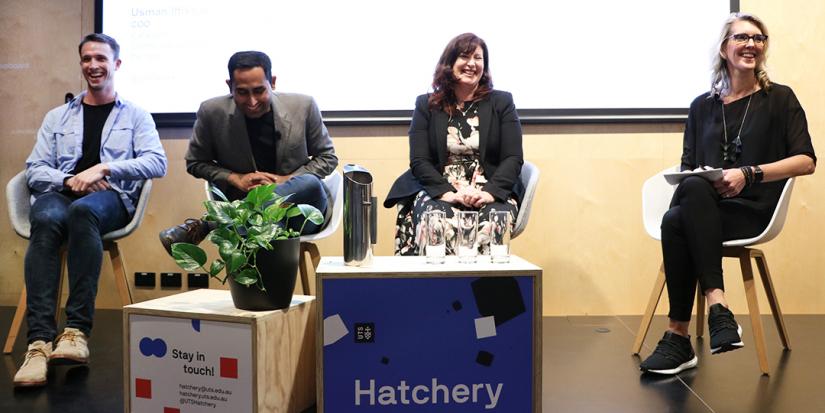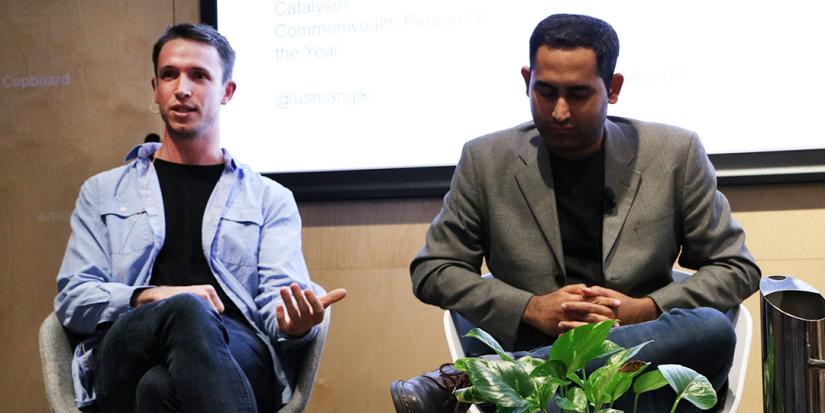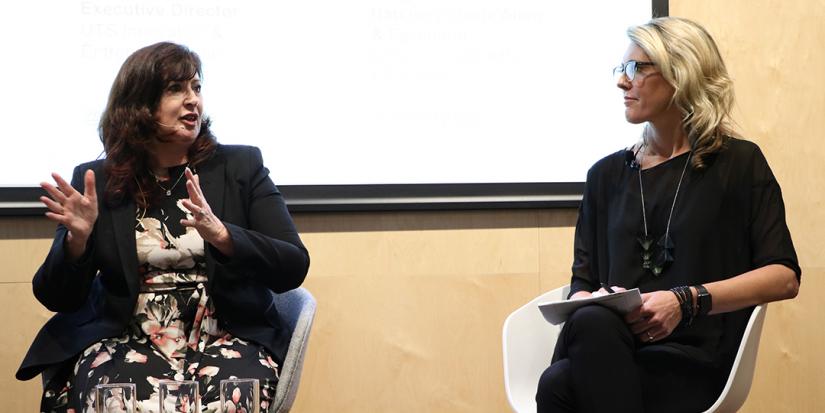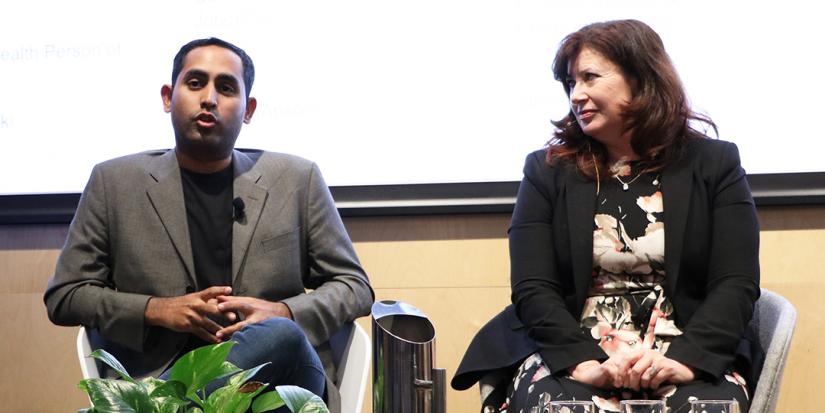Our changing workplaces mean we’re increasingly having to learn new skills. And for young people looking to get a job, it’s not what you know, but what you can do with it. At the same time, employers are having to be more agile to capture this new generation of workers.

Pictured from left to right: Hugh Boddam-Whetham, Usman Iftikhar, Fiona Anson and Margaret Maile Petty. Photo by Liam Kennedy.
So what do we need to do to adapt? Can we even teach these skills? And how can we change the way we think about entrepreneurship in Australia and across the world?
We put these questions to a panel, mediated by UTS Innovation & Entrepreneurship’s Professor Margaret Maile Petty, alongside JobGetter CEO Fiona Anson, Catalysr CEO Usman Iftikhar and UTS alumnus Hugh Boddam-Whetham.
Margaret Maile Petty (MMP): What shifts are you seeing that are clues for where we need to be focusing and how we need to be adapting, to really meet the future of work head on?
Fiona Anson (FA): Part of what we do at JobGetter is measure what’s going on in the workforce every single day. We take all of the publicly available job data to get a really good insight into what employers are actually looking for. There’s a real shift towards what we are calling ‘soft skills’: enterprise and human skills. Whereas years ago, there was a real focus on what you studied, what we are seeing now is a move towards generalists – people who understand the big picture and understand how everything fits together. Empathy, problem solving and applying critical thinking to those bigger problems is where work is heading. We are becoming problem solvers, as opposed to doers.
Hugh Boddam-Whetham (HBW): McKinsey released a report saying potentially 30% of the workforce could be automated by 2030. And so when people think about the future of work, they think AI and automation, and that doomsday story of ‘AI’s going to take all our jobs’. In terms of AI, people often think there’s one broad concept, but there’s a few different levels. So if you can take assisted AI, which might just be Excel helping you work better, and then augmented AI, which is where we’re moving to at the moment. I think that’s where the soft skills are in more demand than some of the technical skills. That 2030 horizon is not far away, and so programs like the Hatchery, and trying to teach these flexible thinking skills, are fantastic to help drive that growth.

Usman Iftikhar (UI): Being an entrepreneur today is a lot easier than it’s ever been. Capital is easier to get, and when you first experience the problems that come with starting out, the solutions are more accessible than ever, for everyday people. And I speak from my own personal journey. I’ve only been in Australia for five years, and I was finding it hard to get employment, so I started an incubator. I just tried to make that migration work: ‘Can’t find a job, so you’re going to start an incubator, which is going to help other people start businesses’. So it’s just a matter of reimagining our systems, and really giving it a go.
MMP: That’s an important point – we talk about how many jobs are going to be replaced by automation or AI, but we don’t talk about how many new jobs are going to be created or transformed. On that, Fiona, you have all this rich data on the workforce and what’s needed, but are you seeing a difference in what job seekers are looking for?
FA: Previously, you got a job just to fulfil what the job required. Now, people are looking more holistically, more globally, and asking: ‘What can I do to make a difference?’. Job seekers are certainly more choosy than they’ve ever been. We talk to employers about how you’ve actually got to earn the right for these people to want to work for you now, it’s not about just saying: ‘Hey, we’re a big-name company, everybody’s going to want to come and work for us’. Job seekers are certainly being more choosy, and they want a difference.

MMP: Are companies taking that on board?
FA: HR people don’t move very quickly. A lot of them still think: ‘I could put up an ad up, and people will come to me because I’m a big brand’, but that’s not the case anymore. We keep saying to employers: ‘If there was a war for talent, the job seekers won it. Because they’re now going to choose you, rather than the other way around’.
MMP: So Hugh, we were talking about skills; those human skills. How do you see those skills as useful in the work that you do in the finance industry? Are you using them?
HBW: Yeah, definitely. In my business degree I majored in finance and economics, so you’re taught structured thought processes throughout. But it’s definitely a base for an entrepreneurial mindset and I think it’s a really good point of difference as well, especially for young graduates who are coming into a large corporate organisation which isn’t fast to change. If you go in with a different point of view, and have the confidence to express it, then it can really be of value.
MMP: One of the other themes we wanted to talk about tonight is mobility, and that’s continuing to be a challenge for entrepreneurs. We’ve seen a lot of discussion around visas and what’s available in Australia and other countries. I want to ask you, Usman, because you’re working on the Youth Entrepreneurship Visa, why it’s an important project for the G20? Why is it important to lower those barriers for young entrepreneurs?
UI: It’s just basic maths. We have a population of seven billion on the planet – imagine if everyone had the opportunity to create whatever they wanted to create and make the world a better place. That, unfortunately, is not possible right now. One of the best ways we can solve these issues we’re facing is by encouraging the movement of people and connecting them with each other. In terms of the G20 and the Youth Entrepreneurship Alliance, our focus is to present the voice of the youth across the G20 countries, as young entrepreneurs. And the government is actually moving on this; one of the state election promises in South Australia by the Liberal Party was to pilot a startup visa. So we’re seeing these changes, and I think the reason for that is the talent war has grown in intensity. If talented people could choose wherever they wanted to go, the countries that would be open to this would reap all the benefits.

MMP: Recently, Saul Singer, author of Startup Nation and Innovation Science Australia board member, was here and gave a talk at UTS, and he quoted Andreas Schleicher from the OECD, saying: “The world economy does not hire you for what you know. Google knows everything. The world economy hires you for what you can do with what you know.” Is this another way of saying we need to focus on soft skills? Can we teach those?
FA: I think we’ve got a couple of issues in Australia: one of them is our fear of failure, or the association of what failure means. I spent some time in Silicon Valley, and it’s totally different over there. If you fail over there, people go: ‘Good on you, you gave it a shot. What are you going to do next?’. So we have to re-engineer our thinking around that, and get rid of the tall poppy syndrome that we have here. We’ve got to embrace innovation. Forget about failure. Failure is just something that we tried and didn’t work and we learn from it.
HBW: I completely agree about being able to teach the mindset. It’s hard to change people and the way they think, but it’s definitely something that is teachable. It’s up to people and organisations to really take the forefront. Running programs on the ground; that’s where the real change happens.
UI: The mentality of how we perceive risk is such a crucial thing. But that mindset shift is not going to happen by simply talking about it. We learn by creating and building things, so Hatchery is a good example of that. There are people I’m really excited about hearing pitch tonight, because those are the people we need to get behind. Giving a voice to people who are already out there doing it; that’s the best way to mediate that.
Visit entrepreneurship.uts.edu.au and sign up to our Innovation and Entrepreneurship newsletter to discover more entrepreneurial opportunities at UTS.

